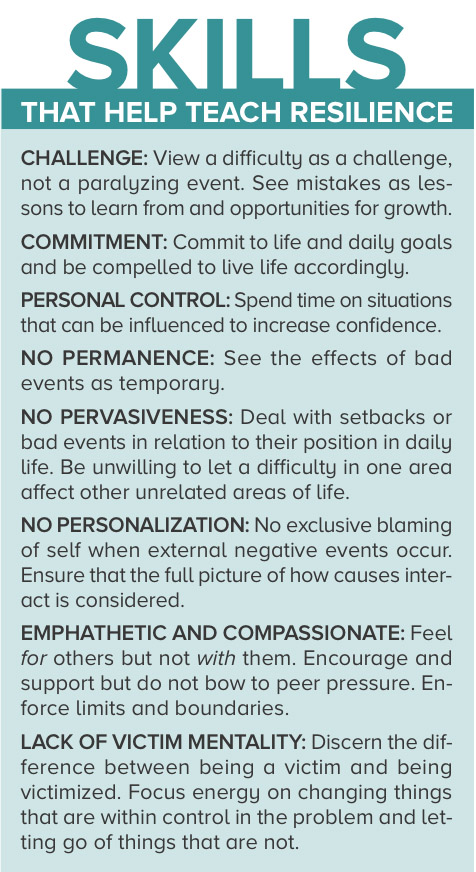 |
One of the fun parts of managing this column is that I’m never quite sure how God is going to bring it all together—I just know that he will. For example, when I asked Jenni Schubring to write about how to teach our children resilience, I did not expect her to say, “My take is not very pro-resilience.” Hmm. That hadn’t occurred to me. Can someone really be anti-resilience? Jenni continued, “I’m happy to write something, but I will tell you, it’s a different perspective.” At that point, I was hooked. I loved the idea that this was going to be a nuanced conversation on a topic that I never expected to be so nuanced. So, I present to you two different perspectives on the topic of resilience. I encourage you to read them both and see how you can incorporate portions of each into your parenting—and perhaps even your own life.
— Nicole Balza
RESILIENT: (ADJECTIVE) able to withstand or recover quickly from difficult conditions.
I think it’s safe to say that many of our children had to deal with difficult conditions this past year. My children had to deal with a lot of loss: from sports and performances to graduations and celebrations. Not to mention all of the social things that were—and still are—canceled. It felt like my kids got hit hard. It was hard to watch. I imagine it was for you too.
Especially in times like these, I want my children to be resilient. I want them to recover. Quickly. But is that what is best for them? Teaching them resiliency seems like a good goal. But am I asking too much to expect them to recover quickly? And for whose comfort?
As a mom and a foster mom, I do not like to see my children suffer. It hurts my heart. My hurt is uncomfortable. But when I pause and look at my motivation to see resilience, I have to check to see if it is to ease my own discomfort.
As Paul tells us, suffering is part of a process that our Father uses for our good.
In Romans, Paul says “We also glory in our sufferings, because we know that suffering produces perseverance; perseverance, character; and character, hope. And hope does not put us to shame, because God’s love has been poured out into our hearts through the Holy Spirit, who has been given to us” (5:3-5).
God promises all things for our good. Oftentimes we relate “good” with “comfortable.” But as Paul tells us, suffering is part of a process that our Father uses for our good. If resilience is our goal, is it possible that we miss out on the perseverance, character, and hope?
If resiliency is the goal, we also might miss out on teaching our children to honor the feelings that they have. Let them be sad, hurt, disappointed, angry. This might take time. We don’t want them to stay there, but we don’t want them to dismiss these real feelings either. If they dismiss those feelings now, the feelings will come back. My children are healing from the “difficult conditions” now through counseling, Bible study, and some really hard conversations with my husband and me.
I hold on to the fact that we are able to withstand or recover because we have a heavenly Father who promises he will always be there, our Savior Jesus who made heaven possible, and the Holy Spirit who guides our steps through this life. God doesn’t promise us earthly resiliency, but he is faithful and gives us faith that is resilient.
Jenni Schubring
WHEN MY SON was younger, we enjoyed going to the batting cages. It was a fun challenge trying to hit the ball no matter how fast it came or whether or not you were quite prepared. There were good swings that just missed, bad ones that were too early, and the rare one that was perfect. The trick was being ready, timing the ball’s release just right, and then taking your best swing. Sometimes it worked out, other times not.
Life is a bit like that. It throws challenges at us in varying ways and at unsuspecting times. We have choices of how to interact. We can be angry and act like it is unfair. We can stand there and watch life go by, too afraid to move. Or, we can stand tall, focus, and take our best swing. Resilience is the idea that no matter what happens, we practice our best approach, follow through, bounce back, and keep swinging.
You might know some resilient people—maybe you’re even one of them and you’re concerned because your children struggle to be. Your daughter cries at every grade below an A-minus. Your son gets angry at his sister for crying. They worry about the smallest things in their future, and when something bad happens, they often struggle to get past it. Our thoughts and emotions get in the way and sometimes hold us back from “bouncing” through the challenges.
 Here are a few skills to model for your children:
Here are a few skills to model for your children:
Your daughter might want to focus on the skill of personal control. We build confidence and reduce helplessness by working on things that we can influence and letting go of things we cannot. What can your daughter do about her grades? She can continue to study or ask for corrections. What she cannot do is go back and change an answer or control the teacher’s grading scale.
Maybe your son could improve his empathy and compassion in dealing with his sister. Here we want to encourage listening and understanding while realizing this does not mean we need to feel sad or weak. Model good listening and reflecting skills for him to practice. He will benefit from connecting to his sister and will learn how to encourage and support people, which in turn will make him proud of his actions as well.
All of us can use a positive image of the future as a resilience tool. The Bible gives us many examples of people just like us and our children. Biblical-era difficulties might have been different, but the people’s doubts and fears were the same as ours. Just like us, they had to learn that resilience is required and, moreover, that as Christians we have a resilience that cannot disappoint. We are children of the King and have a peace that surpasses understanding.
My favorite way of painting a picture of my future in heaven is thinking about John 14:2,3: “My Father’s house has many rooms; if that were not so, would I have told you that I am going there to prepare a place for you? And if I go and prepare a place for you, I will come back and take you to be with me that you also may be where I am.” Sometimes I imagine how Jesus prepares a place for ME. There is no more positive image of the future than that of our heavenly home. In difficulties, let us rely most on that knowledge to help us bounce back.
Karen Fischer
Authors: Multiple authors
Volume 108, Number 4
Issue: April 2021
- Parent conversations: How can parents and kids manage stress?
- Parent conversations: What do your prayers for your children include?
- Parent conversations: How do we resist making our parenting law-based?
- Parent conversations: What Bible passages do you turn to most as a parent?
- Parent conversations: How can we help kids develop positive, healthy habits?
- Parent conversations: What tactics do you use to encourage children to tackle difficult tasks?
- Parent conversations: How can we model good listening skills for our kids?
- Parent conversations: How do we help our kids move on from mistakes?
- Parent conversations: How can we instill gratitude in our children?
- Parent conversations: How can parents find the balance between being too restrictive and too permissive?
- Parent conversations: How can we teach kids to be good friends?
- Parent conversations: What life skills will help young people as they transition to adulthood?
- Parent conversations: How do we discuss death with our children?
- Parent conversations: What does it look like for a father to be a strong Christian leader?
- Parent conversations: How can we help young adults stay engaged in the church?
- Parent conversations: What do parents need to know about video games?
- Parent conversations: How do parents not let worry get the best of them?
- Parent conversations: How do we teach our kids to value all people?
- Parent conversations: When parenting philosophies differ
- Parent conversations: How can we help today’s overwhelmed teens?
- Parent conversations: How can parents maintain a healthy marriage?
- Parent conversations: You might be a Lutheran parent if . . .
- Parent conversations: Parenting post–high school: What is a parent’s role?
- Parent conversations: How can families use the hymnal in their worship life at home?
- Parent conversations: What should Christian parents teach their children about gender?
- Parent conversations: What is vocation? How does it apply to parenting?
- Parent conversations: Why do siblings fight? How should I react when they are fighting?
- Parent conversations: How do we teach children resilience?
- Parent conversations: How do I approach vaccines as a Christian parent?
- Parent conversations: How can I explain the Sixth Commandment to a young child?
- Parent conversations: How can I help my child have an optimistic outlook?
- Parent conversations: What if we can’t follow our Christmas traditions this year?
- Parent conversations: What are ways to foster a rich prayer life in children?
- Parent conversations: How can I let the gospel shine as I parent?
- Parent conversations: How should I handle a child’s separation anxiety?
- Parent conversations: How should families prepare to go back to school?
- Parent conversations: How does a teen’s brain work?
- Parent conversations: How much should I monitor my child online?
- Parent conversations: How can parents reassure children during an uncertain time?
- Parent conversations: How can I stay calm when my child is out of control?
- Parent conversations: Should I give something up for Lent?
- Parent conversations: How can I keep my child engaged in attending church?
- Parent conversations: How can we help a stressed-out kid?
- Parent conversations: How can we nurture a proper view of “stuff”?
- Parent conversations: How involved should parents be in a child’s homework?
- Heart to heart: Parent conversations: Are we modeling kindness for our children?
- Heart to heart: Parent conversations: What’s the best parenting advice you’ve received or given?
- Heart to heart: Parent conversations: How should we handle it when people undermine our parenting decisions?
- Parent conversations: How can we prepare children for summer camp?
- Heart to heart: Parent conversations: What’s a parent’s role as a child dates?
- Heart to heart: Parent conversations: How do parents find contentment?
- Heart to heart: Parent conversations: How can we help a family with a sick parent?
- Heart to heart: Parent conversations: How can parents model healthy cell phone use?
- Parent conversations: How can we protect kids without scaring them?
- Parent conversations: What does your family’s bedtime routine look like?
- Parent conversations: What do I need to consider before I give my child a cell phone?
- Parent conversations: How can we teach gentleness and strength at the same time?
- Parent conversations: What should we do when our children grow silent?
- Parent conversations: What should we teach our children about the Reformation?
- Parent conversations: Do we want our children to be leaders or followers?
- Parent conversations: How does a parent’s role change over time?
- Parent conversations: How should I handle a disagreement with my child’s teacher?
- Parent conversations: What are the building blocks of a strong parent/child relationship?
- Parent conversations: What is our goal as parents?
- Parent conversations: What Christmas traditions do you cherish in your family?
- Parent conversations: How can we raise a generation that cherishes life?
- Parent conversations: What are the best Bible story books for family devotions?
- Parent conversations: Why should children obey their parents?









